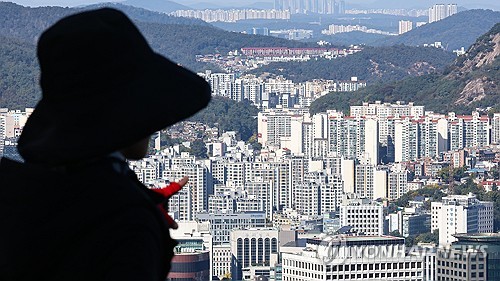(Seoul=Yonhap Infomax) The ladder stands as one of humanity’s most significant inventions, rivaling even the wheel. It is a tool that has enabled people to overcome physical limitations and reach greater heights, and, like Jacob’s Ladder, it has served as a symbol connecting heaven and earth.
Recently, the term “ladder” has taken on new meaning in South Korea. The question “Is the ladder open to everyone?” is often met with cynicism, with many lamenting that “the ladder has been kicked away.”
A single remark by the First Vice Minister of Land, Infrastructure and Transport—“Save money and buy a house when prices fall”—was intended as a message to wait for housing market stabilization. However, coming from someone who owns a 3.3 billion won ($2.5 million) apartment, it was widely mocked. Many voiced frustration, asking how one could ever save enough to buy a home when prices are dozens of times higher than annual salaries.
Even saving every penny, it would take more than a decade to afford an apartment in Seoul. The Vice Minister’s comments, which failed to acknowledge the desire for better neighborhoods and environments, ultimately led to his resignation. His statement that opportunities would return once the real estate market stabilizes only fueled public anger over issues of equal opportunity, social mobility, and fairness—the very “ladder” that many feel has been removed.
The Vice Minister’s words became a flashpoint, intensifying public outrage that government real estate policies—such as designating land transaction permit zones and tightening lending regulations—have effectively severed the ladder of opportunity. The threshold for moving to more desirable areas has risen, deepening the divide between the haves and have-nots.

Last month, EBS aired “DocuPrime—Has the Social Ladder Been Broken?” The program used statistical analysis and firsthand accounts to expose the widening educational gap and the overheated private education market in South Korea. Revisiting familiar issues, the documentary sparked significant public debate by vividly illustrating the collapse of the social ladder.
Bank of Korea Governor Rhee Chang-yong, who proposed a “regional proportional admissions system,” appeared on the program. This system would allocate admissions quotas at major Seoul universities based on the proportion of school-age populations in each region, but has sparked controversy over alleged “reverse discrimination” against Seoul residents.
According to Rhee, over 80% of new students at SKY universities (Seoul National University, Korea University, Yonsei University) and medical schools come from the highest income brackets, with opportunities increasingly limited to those who can afford to pay. Rhee criticized the prevailing notion that this is fair and normal.
He added, “No one is happy. The reason there is no happiness now is real estate and education.” Real estate and education have long been the primary ladders for social mobility in South Korea. There was once hope that one could climb the social ladder through real estate investment or admission to prestigious schools. High home prices in top school districts and the link between residential location and educational success have become inseparable realities.
On October 21, President Lee Jae-myung stated at a Cabinet meeting, “We must deploy strong policy tools and focus our capabilities to thoroughly suppress unproductive speculative demand, which has triggered warning signals.”
He further instructed, “All ministries must make every effort to block speculation that distorts the national economy.” At the same time, he commented on the KOSPI, which has been hitting record highs, saying, “The stock market is on a path toward normalization.”
The Lee administration has consistently conveyed the message that it is desirable for the primary means of wealth accumulation to shift from real estate to equities. The era of the KOSPI at 4,000—once thought unattainable under the so-called “Boxpi” stigma—has arrived. During the previous administration’s “Value-Up” initiative, it was emphasized that “the stock market is a platform for mutual growth between the public and corporations, and a ‘ladder of opportunity’ for asset accumulation. To prevent social stratification and enhance social dynamism, the financial investment sector must be revitalized.”
The call to shift the ladder of wealth accumulation from real estate to equities transcends administrations and reflects the spirit of the times. Yet, even in the KOSPI 4,000 era, stocks—lacking a track record of widespread success—struggle to supplant the myth of real estate as the ultimate ladder. Some speculate that profits from equities will eventually flow back into the property market.
Whether in real estate, education, or equities, the ladder always points upward, but its direction does not guarantee hope. Criticizing those who have already reached the top for “kicking away the ladder” changes nothing. Even as we claim the ladder is broken, we still strive to provide our children with a better one. The desire for a ladder to a better future never ceases. (Chief of Securities Department)
sykwak@yna.co.kr
(End)
Copyright (c) Yonhap Infomax. All rights reserved. Unauthorized reproduction or redistribution, as well as AI learning and utilization, are strictly prohibited.
Copyright © Yonhap Infomax Unauthorized reproduction and redistribution prohibited.

